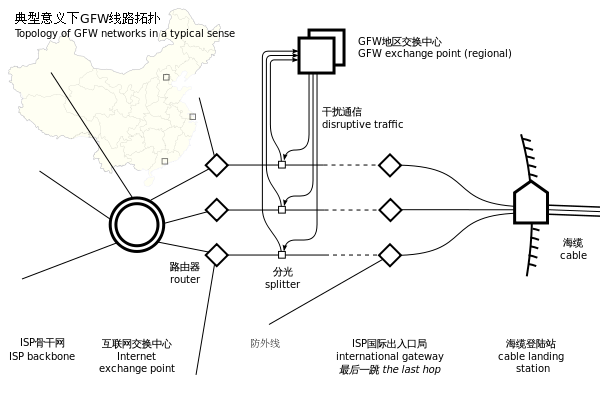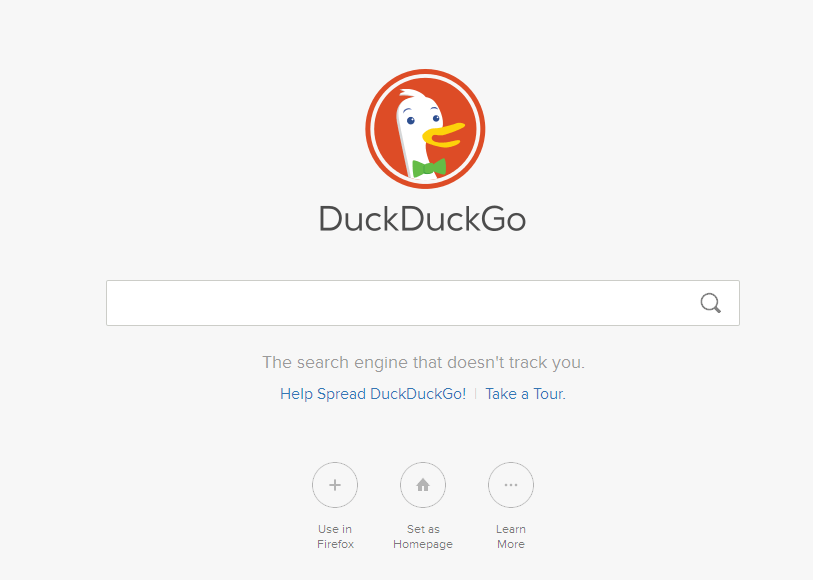Of all the search engines in the world, one of the most intriguing is Duck Duck Go. While the search engine hasn’t been able to topple heavyweights like Google or Bing, Duck Duck Go (DDG) has been in the news as of late, thanks to it being the latest US online service to be blocked by China. But, what exactly prompted this ban?
First, a History of Duck Duck Go
 Screenshot of About Duck Duck Go 9/30/14
Screenshot of About Duck Duck Go 9/30/14Before we get any further, here’s a brief history of Duck Duck Go if you’re unfamiliar with the search engine.
Duck Duck Go was founded by Gabriel Weinberg in February 2008 in Valley Forge, Pennsylvania, and was named after the classic children’s game Duck, Duck, Goose. What makes the search engine stand out for competitors is that it doesn’t collect or share personal information about its users. On top of protecting the privacy of searchers, Duck Duck Go also combines user-generated content from Wikipedia with “a search engine’s algorithmic search technology” to create what TechCrunch calls a hybrid search engine. This allows users to perform search inquiries easier and faster.
2011 was a big year for the search engine. Union Square Ventures invested, and it became the default search engine for Linux Mint 12, Trisquel, and Midori. Furthermore, Alexa reported that DDG had experienced a 3-month growth rate of 51%. However, DDG had a boost in traffic on June 17, 2003 with three million daily direct searches. Some believe that this increase in traffic was in response to the PRISM program – which would give the US government the power to read citizens search data. Danny Sullivan argued on Search Engine Land that people aren’t that concerned with privacy, and that news surrounding the NSA wasn’t enough for DDG to become a threat to Google.
By February 26, 2014, Duck Duck Go achieved five million direct searches in one day. And, when Apple announced that the search engine would be an option for both iOS 8 and OS X Yosemite at WWDC 2014, it appeared that Duck Duck Go was at least going to capture a bit more of the search engine market. And then it was blocked in China.
According to GreatFire.Org, DDG was blocked in China on September 3. Barry Schwartz stated,
“It is unclear as to why China has blocked the search engine but it might be due to them not complying with their filtering regulations.”
But, if you’ve been up with current events in China, then you would know that the blocking of websites and web services has been an ongoing trend.
Censorship in China
 Image Source: Wikipedia
Image Source: WikipediaAs Time noted in a 2009 article, as long as there’s been internet (which arrived in 1994) in China, the country “has sought to monitor and control how its citizens use it.” Because China has 618 million internet users, which is almost twice the population of the United States, it relies on massive projects like the “Golden Shield Project,” as more commonly known as the “Great Firewall.”
It’s been estimated that the Great Firewall employs 50,000 government employees, which is run by the Ministry of Public Security. The project is both controversial and interesting since it was Western technology that allowed China to enter the technological age, as well censor it.
Murray State University states the functions of the project include “DNS pollution and injection, IP and port blocking, TCP reset, interfere secure connection, proxy blocking, IPv6 censorship and Email blocking.” It also blocks Chinese people from the outside. This complex system consists both of hardware and software. According to Murray State University, “the hardware part is mainly based on CISCO’s internet devices and forms an intrusion detection system. These hardwares are deployed on the international gateway and local Internet centers of China’s major ISPs (Internet Service Provider, smaller ISPs are sharing the same gateway with major ISPs).”
Stanford University adds:
“What makes the Great Firewall of China so effective (and controversial) is not only its complex technology but also the culture that the system engenders – a culture of self-censorship. The Chinese government mandates that companies be responsible for their public content. In other words, it is the job of these companies to make sure that their online portals do not contain any prohibited topics or obscenities.
Leading online news media in China, such as Xinhuanet.com, Chinadaily.com.cn, Chinanews, and Baidu.com obediently follow the government’s decree, pledging that they “will make the Internet a vital publisher of scientific theories… maintain social stability, and promote the building of a socialist harmonious society.”
Transnational Internet corporations such as Google, Yahoo!, and Microsoft are also subjected to self-censorship regulations. Although censorship is very much against Western ideology, the size of the Chinese market is too profitable for the companies to bypass these opportunities. However, self-censorship does attract criticism in the Western hemisphere. For example, Google’s decision to censor some of its content to please the Chinese government is currently one of the most discussed topics in the Western media.”
Because of this censorship in China, the Great Firewall has been scrutinized by organizations like Amnesty International and Reporters Without Borders for blocking websites and web services, as well monitoring Internet access of its citizens. However, there’s also an economic impact for blocking sites like Google, Facebook, YouTube and Skype.
China has it’s own companies that offer similar services. Instead of Google, there’s Baidu and Alibaba. There’s also social networking sites like Renren, video sites Tudou and communication services like China Telecom. In short, Chinese businesses have benefitted from preventing international companies to compete with these local companies.
As Malcolm Moore noted in The Telegraph, “Stamping out foreign competition is nothing new. All countries do it. But China is quickly becoming the most aggressive and protectionist country out there.”
So, Why Was Duck Duck Go Banned?
As almost every report covering the story has claimed, there’s been no official explanation on why China has blocked Duck Duck Go. However, it’s a safe guess that the search engine was blocked because it doesn’t filter it’s search results. And, this is a concern for China if internet users search for information on Tiananmen Square or the recent protests in Hong Kong. There could also be concerns over DDG’s focus on privacy.
Regardless of the exact reasons, Duck Duck Go now joins the extensive list of websites that have been blocked in China. However, while that’s a blow for the search engine’s international presence, the deal with Apple and rising privacy concerns shouldn’t prevent Duck Duck Go from potentially overtaking search engines like Bing.
If you use Duck Duck Go, let us know what you think about the search engine and it being blocked in China by leaving a comment.
Featured Image: Screenshot of Duck Duck Go taken September 30, 2014





![AI Overviews: We Reverse-Engineered Them So You Don't Have To [+ What You Need To Do Next]](https://www.searchenginejournal.com/wp-content/uploads/2025/04/sidebar1x-455.png)